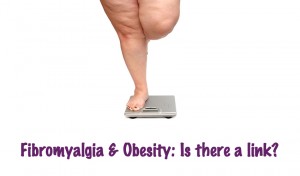Fibromyalgia & Obesity: Is there a link?
 A paper by Akiko Okifuji from the University of Utah, Salt Lake City, just published in the Journal of Pain, examines the relationship between fibromyalgia and obesity in pain, function, mood, and sleep. This has pointed a finger at something pretty obvious — a lot of us with fibromyalgia are obese. Researchers say the obese participants had more pain, worse sleep, less sleep and poorer flexibility.
A paper by Akiko Okifuji from the University of Utah, Salt Lake City, just published in the Journal of Pain, examines the relationship between fibromyalgia and obesity in pain, function, mood, and sleep. This has pointed a finger at something pretty obvious — a lot of us with fibromyalgia are obese. Researchers say the obese participants had more pain, worse sleep, less sleep and poorer flexibility.
The Study
The study examines the impact of obesity on hyperalgesia, symptoms, physical abilities, and sleep in 215 fibromyalgia patients, who also underwent tender point examination, physical performance testing, and 7-day home sleep assessment.
Almost 50% of participants were obese and an additional 30% were overweight.
It’s not surprising that, as a group, fibro sufferers are overweight: most sufferers are far less active than they used to be; some take medications that can cause weight gain; a lot of doctors and researchers believe fibro patients have some sort of metabolic problem; and prone to sleep disorders, and a sleep-deprived body won’t lose weight. So yes, often times fibro sufferers gain weight more than others.
Researchers in the study didn’t look at whether obesity was a cause or effect — likely because we have prior research indicating that obesity is a risk factor for fibromyalgia and vice versa. Instead, they were trying to gauge the effect.
It makes sense that excess weight makes symptoms worse: it puts more strain on our bodies; it’s harder to get comfortable to sleep; obesity can lead to sleep apnea, which can seriously disrupt your sleep; both fibromyalgia and obesity make exercise more difficult, which leads to less strength and flexibility.
Of course, it can also go the opposite way. A lot of patients develop fibromyalgia secondary to other health problems, especially chronic pain, thyroid problems, and blood-sugar issues — all of which can cause weight gain. And let’s face it, obesity is an epidemic all it’s own.
So regardless of why fibro patients are overweight, this study shows that it makes fibromyalgia symptoms worse. That’s bad. So what can we do about it?
The researchers concluded that weight management may need to be incorporated into treatment regimens. The really great doctors out there are probably already working on that, by encouraging a healthy diet and appropriate levels of activity.
I think what we need to take away from this research is that it doesn’t really matter whether you have gained weight because you are sick or you are sick because you’re overweight — the extra pounds makes the condition worse and also puts you at risk for other health problems. Do what uou can to improve your health overall, but remember that it’s likely to be a journey and not a sprint.
Have you been able to improve your symptoms through weight loss?
What helped you lose weight?
Have you lost weight, only to have your symptoms stay the same or get worse?
Share your weight loss stories by leaving a comment below!
Sources: http://www.ncbi.nlm.nih.gov/pubmed/20542742 , drsharma.ca/obesity-compounds-pain-in-fibromyalgia.html, chronicfatigue.about.com/b/2011/01/11/fibromyalgia-obesity-cause-effect-or-vicious-cycle.htm




I was diagnosed with Fibro in 2011, and continued to gain weight once I was put on Cymbalta. So, in March 2014 I read Dr. Joel Furhman’s book, “Eat to Live” and lost 20 pounds in 42 days. I have kept it off for 3 months, and I began the program again today. Did it help? Well, yes. I sleep better and take less medicine. I hope to feel even better in another 6 weeks.
How do I get in touch with this eat to live progam you talked about?
I was diagnosed with Fibromyalgia shortly after I had lost about 60 lbs (from my last pregnancy)– the healthiest weight I had been in about 10 years, a “normal” BMI. At the time I wondered if losing weight had somehow, strangely, CAUSED my pains/diagnosis. I kept it off for a couple of years but then gained almost all of it all back in about 9 months post ovarian cystic surgery. I imagine it was due to changes in medications, changes in physical activity and eating habits during recovery- which have not easily reversed, and hormonal upheaval. It’s been a nasty backslide but one thing’s for sure for me– I can have fibro whether I’m at a healthy weight or whether I’m at an unhealthy one.
Thanks for sharing your story Maria. I agree, you can have fibro regardless of weight. There does seem to be support though for a large portion of fibro sufferers that they are more at risk for weight gain.
I agree. It’s definitely been harder to lose weight with fibro than without. If so many other systems are functioning improperly, why not metabolic? Whether directly or indirectly, it has to be somehow effected. Not to mention the additional pain as a demotivator for the needed movement in weight loss. Plus many more factors, there is much stacked against us.
It’s a small sample size. It also fuels the”lose weight and you won’t be in pain” line of thinking. As noted in the study, they didn’t test anyone after weight loss, so maybe people who have less weight have less pain.
So we can’t conclude losing weight will help.
All Valid Points Duder, Thanks for Sharing Your Thoughts!